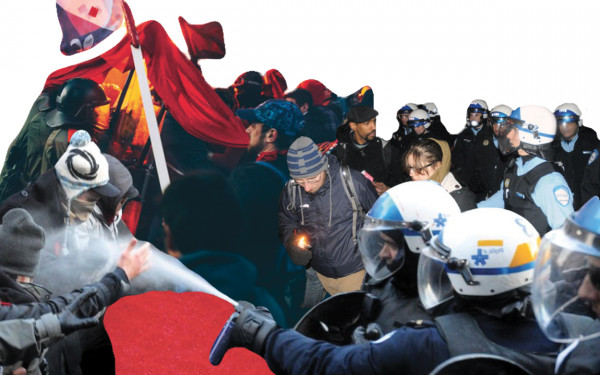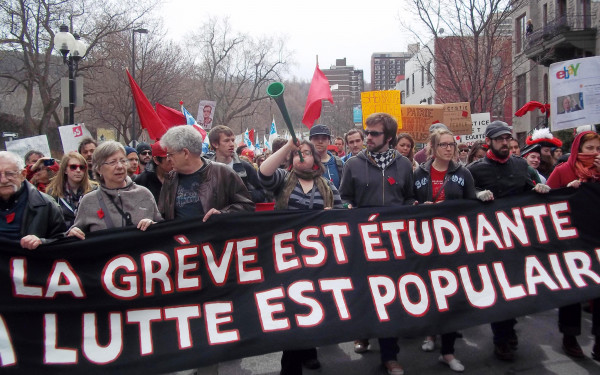Fall is Coming: Mobilization Against Austerity is Not Over
Printemps 2015 is over. The highly anticipated movement against the austerity measures implemented by Quebec’s Liberal-majority government saw its share of tense, internationally visible demonstrations last spring.
The lasting results of these protests, besides bringing the conversation of austerity and police brutality to the forefront of public discourse, are not definitively known.
The student protests over tuition hikes in 2012 resulted in former Premier Jean Charest leaving office. The current Premier Philippe Couillard isn’t expected to leave office anytime soon.
Now, the public sector continues to deal with the consequences of an announced $1 to 3 billion in cuts over the span of two years to offset it’s growing debt. Concordia University has also suffered a loss of $36 million in a three year period, according to Concordia’s Chief Financial Officer Patrick Kelly.
“It’s very hard—we had to make very difficult decisions, but we worked very hard with people to make those decisions,” Kelley said in an interview with The Link in July. “If we had more money, would we do more—absolutely.”
Mobilization against austerity is not over, however. Last spring, demonstrations in Montreal mainly consisted of students enforcing strike mandates. This fall, deliberation about whether labour unions in the public sector will go on strike is expected. Many collective agreements between workers and their employers have expired, with negotiations ongoing and often at odds.
“It’s going to be a hot autumn this year,” said Jean Lortie, Confédération des syndicats nationaux (CSN) secretary general.
“It’s going to be a hot autumn this year,” said Jean Lortie
CSN represents approximately 300,000 workers in Quebec. The overarching union is trying to create a common front and have its affiliated unions hold individual general assemblies to vote yes or no for a strike mandate, Lortie says.
He adds that the plan is to have all its affiliated unions have a vote by the end of the month, so that they can announce the results for a “grande manifestation” in Montreal on Oct. 3. Dialogue is positive between other labour unions in Quebec, such as the Fédération des travailleurs et travailleuses du Québec (FTQ), and a formal coalition against austerity is still in the works, according to Lortie.
The Dawson Teachers’ Union (DTU) from Dawson College is holding a general assembly to vote on a strike mandate within the next few weeks. The DTU is affiliated with CSN as well as the Fédération nationale des enseignantes et des enseignants du Québec (FNEEQ).
Gabriel Tordjman, DTU’s VP External, says that securing a strike mandate from its membership won’t necessarily lead to immediate striking, but means the union can strike if needed. During a GA last semester, a strike mandate to resist austerity measures was six votes shy from passing, he adds.
This time, however, a strike mandate would be decided on with their collective agreement still in negotiations. Tordjman says the process is slow, and that movement is occurring on smaller issues, but the more substantial issues are not progressing.
Among these slow-paced issues is the disparity in wage increases with the threat of larger class sizes. DTU is asking for a 13.5 per cent increase over three years, while Dawson College admin are offering a 3 per cent increase—with freezes—over five years. In addition, Tordjman says that negotiations are ignoring younger and non-permanent teachers who are being paid less for similar workloads. He also says that administration is trying to seize control of appointing department chairs and approving curricula.
Tordjman calls the latter plays “provocative.” In terms of negotiations, most other CEGEPs are in similar positions and are contemplating strike mandates, he says.
At Concordia, a press release in June said the university reached an agreement in principle with Concordia University Faculty Association (CUFA), which is pending approval by the school’s Board of Governors. The Concordia University Part-Time Faculty Association (CUPFA), also affiliated with FNEEQ and CSN, has been without a collective agreement since the end of April.
The Teaching and Research Assistants at Concordia (TRAC) are currently in negotiations with the school over pay grades in its collective agreement as well. An initial pay grade offer with cuts of up to 43 per cent was rejected in the summer, and a second meeting is scheduled sometime in September.
Back in March, a student protester in Quebec City named Naomie Trudeau-Tremblay was shot point-blank in the face by a tear gas canister. She said she was stunned at the police officer’s actions and is pressing charges.
A month later, approximately 250 protesters from the Université du Québec à Montréal (UQÀM) occupied one of its buildings. The sit-in ultimately led to 21 arrests, as some factions chose to destroy parts of the school property. Two reporters from The Link were inside, mostly concealing their identities within an atmosphere unfriendly to journalists.
For International Workers’ Day on May 1, the SPVM deterred demonstrations throughout downtown Montreal using tear gas. Many bystanders were affected, including one child photographed having milk poured into her eyes to remedy effects of the gas.
The spring congress of the Association pour une solidarité syndicale étudiante (ASSÉ) voted to impeach last year’s executive team for writing a letter of reflection suggesting a “strategic withdrawal” from Printemps 2015. ASSÉ represents 43 student associations across Quebec.
ASSÉ’s course of action for mobilization in the fall is to support and fight by the side of the public sector, especially teachers and professors, according to communications secretary Missila Izza. A gathering of its student unions and those of professors and teachers is being organized and scheduled by ASSÉ for Sept. 26 and 27.
“The month of September will be quite charged,” Izza said. She adds that ASSÉ is in constant dialogue with unions in the public sector. The gathering at the end of the month will see each union vote on proposals for planned action to take in the fall.
Three student associations from Concordia are members of ASSÉ and are expected to take part in that assembly.
Meanwhile, the council of the Concordia Student Union (CSU) adopted and endorsed a “10 Billion Solutions” in a June session. Formulated by La Coalition Main Rouge—a coalition of over 70 organizations united against user fees and privatization of the public sector—the document outlines fiscal solutions different from the austerity measures the Quebec government is implementing in order to run a “zero-dollar deficit.”
“Austerity is not an economical necessity,” said CSU President Terry Wilkings. “It’s a political choice.”
Last semester, over 10 undergraduate and graduate student associations held GAs to vote for or against a strike mandate. Main mobilization and strikes occurred on the key dates of March 23 and April 2, where some association members blockaded and disrupted classes within their department.
This led to three professors pursuing tribunals against a select number of students in May, as the university eventually became co-complainants in the formal complaints. Wilkings says that members of the CSU met with university President Alan Shepard in the summer to “provide context” about the students’ perspective.
“The decision is his to do the right thing,” Wilkings said. “It’s in the best interest of the university to remove itself from formally charging students.”
He adds that the CSU supports students’ rights to resist austerity in any capacity.
“In a democracy, people have the right to protest,” Shepard said in an interview with The Link. “But people also have the right to feel safe.”
He says that he understands resistance to austerity intellectually, but safety of all individuals on Concordia’s campuses, including students, visitors and staff, is priority.
“Austerity is one route that has been chosen, but there are other routes as well,” he said, while acknowledging the pressures the provincial government faces.
The Students’ Society of McGill University (SSMU) also took a formal stance against austerity in a GA vote last fall, according to VP External Affairs Emily Boytinck.
She says SSMU’s current focus is on organizing an anti-austerity week coming up on Sept. 14 to 18, which will be full of workshops and skillshares to educate the McGill and outside community.

(CamilTang)_900_600_90.jpg)

_600_375_90_s_c1.jpg)


